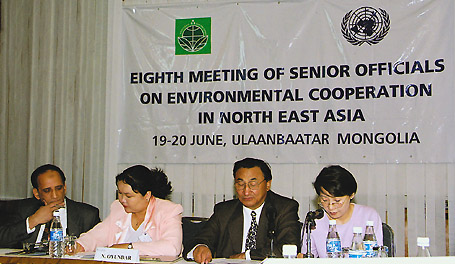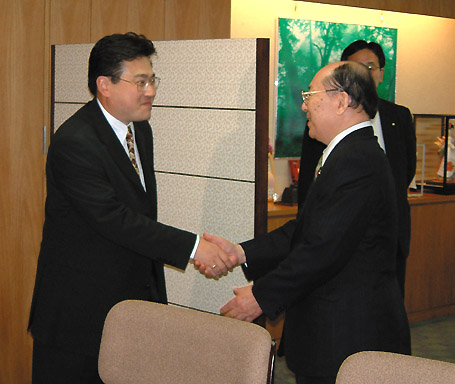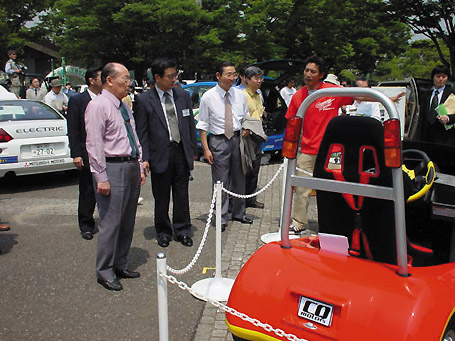Japan Environment Quarterly --Vol.7 No.3 September 2002--
World Summit on Sustainable Development (Johannesburg Summit)
 |
Mr. Hiroshi Ohki, Japan's Minister of the Environment, addresses WSSD participants. |
The World Summit on Sustainable Development was held from 26 August to 4 September in Johannesburg, South Africa. It was the largest international meeting in history, with over 190 countries participating and about 100 heads of state in attendance, including Japanese Prime Minister Junichiro Koizumi, and more than 20,000 participants. Two important documents were adopted at this conference: the Johannesburg Declaration on Sustainable Development, which renews commitments for sustainable development, and the Plan of Implementation, which is the first comprehensive international accord of the twenty-first century.
The main feature of the Plan of Implementation is that it aims to be "action-oriented" by creating concrete action from Agenda 21, adopted at the Earth Summit in 1992. In addition, it integrates a social aspect into environmental and economic aspects--in other words, it emphasizes the need for integration between solutions to environmental issues and the solutions to social issues, such as poverty and human rights.
During the negotiations, large gaps emerged between countries, relating to the setting of numerical targets for the implementation of concrete actions, and to the specific application of the Rio Principles that had been adopted in 1992. Persistent efforts by the host country of South Africa and the efforts of Japan and other countries to coordinate views made it possible to reach agreements.
Japan's Minister of the Environment Hiroshi Ohki and Minister of Foreign Affairs Yoriko Kawaguchi played a key role in gathering support for the Kyoto Protocol. The outcome was that wording was included in the Plan of Implementation that strongly urges countries to ratify the Protocol in a timely manner. Substantial progress was made in this direction when many countries showed their intentions to ratify the Kyoto Protocol, including Russia, Canada and China.
In addition, the "Koizumi Initiative," announced by Prime Minister Koizumi, was highly praised by other countries. Its main pillars are "human resources development," as well as "ownership and solidarity."
In the follow-up to the WSSD, it is crucial that the world takes concrete actions in order to make sustainable development a reality. Within Japan, it is important to make greater efforts to form a society that is "recycling-based" and "global-warming free." On the global scene, it is essential to strengthen international environ mental cooperation, never forget ting the goal of overcoming poverty in developing countries.
 |
Sandton Convention Centre, Johannesburg. |
Japan to Participate in Critical Ecosystem Partnership Fund
On 6 June Japan announced its decision to participate in the Critical Ecosystem Partnership Fund (CEPF), at a joint press conference during the final preparatory committee for the Johannesburg Summit, held in Bali.
Participants in the joint press conference included Japanese Minister of the Environment, Hiroshi Ohki as well as representatives of the founding organizations, Jorgen Thomsen (Senior Vice President, Conservation International), Mohamed T. El-Ashry (Chairman, Global Environment Facility), and Ian Johnson (Vice President, World Bank Group).
As the reasons for Japan's decision to support the CEPF, Minister Ohki emphasized that (1) biodiversity conservation in the world is one of the most critical issues today, with biodiversity hotspots conservation being a particularly urgent challenge; (2) support to the CEPF will contribute to poverty alleviation in the world because the Funds' approach reflects that conservation and economic prosperity are linked; and (3) the Fund supports actual activities by local organizations on site.
Note: The CEPF was established in August 2000 by three parties--the World Bank; the Global Environment Facility, a funding institution for environmental measures in developing countries jointly managed by UN bodies; and Conservation International, a U.S.-based nature conservation group. The aim of the fund is to support local organizations that are active on the ground in developing countries, working to protect "hotspots" that are rich in biodiversity but at the same time face the threats of extinction of species and destruction of biodiversity.
8th Meeting of North East Asian Environmental Cooperation

|
The Eighth Meeting of Senior Officials on Environmental Cooperation in North-East Asia. |
On 19 and 20 June 2002, the Eighth Meeting of Senior Officials on Environmental Cooperation in North-East Asia (SOM) was held in Mongolia. It was organized by the UN Economic and Social Commission for Asia and the Pacific and had the participation of China, Japan, Korea, Mongolia and Russia. The main topics of discussions are covered below.
1. Current projects
Participants discussed the current status of three projects in preparation or already in process under the umbrella of the North-East Asian Subregional Programme on Environmental Cooperation (NEASPEC). A representative of the Asian Development Bank, the donor for the projects, joined the discussion. The projects include (1) Pollution Reduction in Coal-Fired Power Plants, (2) Environmental Monitoring, Data Collection, Comparability and Analysis (under the North East Asian Centre for Environmental Data and Training, or NEACEDT), and (3) Efficiency Improvement of Electrostatic Pre cipitators in Existing Power Plants.
2. Identification of new project proposals
It was decided that an expert meeting would be organized to develop a project proposal in the area of natural environment pro tection, with the aim of exchanging information about the status of relevant activities and identifying areas for cooperation, based on the needs of each country.
3. Management of the Core Fund
Core Fund was established in 2001 to support activities under NEASPEC.
The meeting approved the budget for expenditures from the Core Fund until the next SOM, including costs of holding the expert meeting mentioned above.
The next meeting will be held in Russia in 2003.
Mongolian Minister of Nature and the Environment Visits Japan
 |
Mr. Ulambayaryn Barsbold, Minister for Mongolia's Ministry of Nature and the Environment (left), Mr. Hiroshi Ohki, Japan's Minister of the Environment (right). |
On 2 July 2002, Mr. Ulam bayaryn Barsbold, Minister for Mongolia's Ministry of Nature and the Environment, paid a courtesy call on his Japanese counterpart, Minister Hiroshi Ohki. Part of his message included an appeal to consider the exposure of Mongolia, a country of high latitudes and high altitudes, to the impacts of global warming, and a request that Japan cooperate to help with solutions.
He reported that Mongolia's average summer temperatures have risen by ten degrees-centigrade in the past ten years and that the permafrost has begun to melt. At the same time, average winter temperatures have fallen by more than ten degrees centigrade. In addition, desertification threatens the livelihoods of nomads in the country.
Minister Barsbold called for the environment cooperation of the environmental ministries of both countries, and the two ministers agreed that the two countries would work towards further consideration of how Mongolia and Japan could cooperate on these matters.
2nd China-Korea-Japan Roundtable on Eco-Industry
 |
Group photo from the 2nd China-Korea-Japan Roundtable on Eco-Industry. |
The Second Tripartite Roundtable on Environmental Industry (China, Korea and Japan) was held in Japan on 23 and 24 July 2002 on Awaji Island, Hyogo Prefecture. The previous roundtable was held in Seoul, Korea, in response to the agreement of the first Tripartite Environment Ministers Meeting that the three countries would continue exchanging information to foster cooperation in the fields of environmental industry and technology. It was attended by 55 delegates (5 from China, 21 from Korea and 29 from Japan) as well as 70 observers.
The main themes of the meeting were (1) environmental industry, now and future; the way forward, (2) the greening of business activities, (3) the role of green investment and technology for sustainable development, and (4) mutual cooperation concerning environmental industry. The Chairpersons' Summary covers the main points of this roundtable and tasks for the future (see English text in PDF format at http://www.env.go.jp/press/file_view.php3?serial=3762&hou_id=3498).
The Summary outlines progress made at this roundtable, including (1) extending the scope to greening of broad industrial activities, supply chain management such as green-purchasing, and life-cycle assessment; (2) supporting an approach which enhances partnership among communities, or civil society, markets, and regulators; and (3) making new findings based on the Japanese experience, that the relationship between government regulation and the development of environment industry has been shifting from a "regulation cum reactive response style, to an information-sharing cum proactive response style."
The next Tripartite Roundtable will be hosted by China.
Japanese Diet Approves Accession of POPs Convention
On 25 July 2002, the Japanese Diet approved the country's accession of the Stockholm Convention on Persistent Organic Pollutants (POPs).
This Convention targets twelve types of chemicals that remain intact in the environment for long periods, including PCBs and DDT. Adopted on 22 May 2001, the Convention prohibits the production and use of specified chemicals, requires the preparation of National Implementation Plans for measures to reduce emissions, and covers the proper handling of stockpiles or waste that contain the targeted substances. Fourteen countries had ratified as of 22 July, including Canada, Fiji, Germany, Iceland, Lesotho, Liberia, Nauru, the Netherlands, Norway, Rwanda, Samoa, Sweden, the United Arab Emirates and Vietnam. Fifty countries must ratify the Convention for it to enter into force.
Ministry of the Environment Obtains ISO 14001 Certification
On 8 July 2002, the Ministry of the Environment announced that on the same date it had obtained ISO 14001 certification for its environmental management systems. This is the first such certification among Japan's governmental ministries and agencies.
The Ministry's environmental management system covers the area it occupies in the Central Common Government Offices Building No. 5. It stipulates a total of twelve items as environmental goals, including (1) promoting green purchasing, (2) reducing amounts of electricity used, (3) minimizing waste, (4) encouraging contractors to promote environmental protection, and (5) supporting independent activities by personnel.
New Soil Contamination Countermeasures Law
Soil contamination can pose serious threats to ecosystems. In addition, human health can be negatively affected by the direct intake of pollutants from contaminated soil and drinking water that has absorbed dissolved chemicals . Recently, soil has been found to be contaminated by hazardous substances in an increasing number of cases, such as when as former factory sites are being re-developed. Concern about the health impacts have intensified public demands on governments to establish countermeasures for this type of contamination.
In response to this situation, the Japanese Diet passed the Soil Contamination Countermeasures Law on 22 May 2002. The gist of this law is as follows:
1. Land owners are required to investigate soil contamination of business establishments that handled hazardous substances in the past, or if any concerns arise about damage to health.
2. If land is found to have soil contamination above specific levels, the prefectural governor is to designate that land as being contaminated and provide public notice, and to register the designation in the land registry and publicly disclose the registration.
3. The land owner or party who caused the contamination can be required to decontaminate the soil in the designated area if there are concerns about endangering human health.
Japanese Translation of OECD Environmental Performance Review
The Ministry of the Environment published in early August the Japanese-language version of the OECD Environmental Performance Review of Japan, in order to disseminate the information contained in the report more broadly in this country. The Organization for Economic Cooperation and Development (OECD) published the English version of this report in May 2002.
In OECD Environmental Performance Reviews, the Environment Policy Committee/Working Party on Environmental Performance conducts peer reviews of OECD member countries regarding their implementation of environmental policies. This review program started in 1992. The latest review reports on developments in Japan's environmental policies during the 1990s.
Eco Car World 2002
 |
Minister Ohki inspecting the exhibition. |
As a part of Environment Month in Japan, Eco Car World 2002 was held in Tokyo's Yoyogi Park on June 1 and 2. This annual exhibition of low-emission vehicles was organized under the auspices of the Ministry of the Environment, the Pollution-Related Health Damage Compensation and Prevention Association, and the Tokyo Metropolitan Government.
Ninety-five eco-cars were on display, including electric, natural gas and hybrid vehicles as well as the much talked-about fuel cell vehicles coming onto the market at the end of this year. This is the seventeenth exhibition since the first one held in 1986. The aim of this event is to promote these vehicles as well as a better understanding of air-pollution and global warming, by giving people the opportunity to view and actually test-ride the cars.
A variety of events was held during two days. Environment Minister Hiroshi Ohki and Ms. Tokiko Kato, UNEP Special Envoy, attended the opening ceremony on the first day. With 39,000 visitors, the attendance this year exceeded the typical numbers of past years.
Roseate Tern--6,000 km Migration Proven between Okinawa and Great Barrier Reef
 |
Roseate Terns (Sterna dougallii) are migratory birds that spend the summer in Okinawa, forming large colonies on small islands. They nest in depressions in rocks and sand, flock over water, and hunt for fish and squid. Length about 39 cm. |
On 30 July the Ministry of the Environment announced that for the first time it had confirmed, by a bird-tagging study, that Roseate Terns bred near the main island of Okinawa, wintered at Australia's Great Barrier Reef about 6,000 kilometers away, and returned to the same island in Okinawa this summer.
The study involved releasing birds after tagging them with leg bands or neck rings, and then recapturing or observing them later to obtain information about their ecology and migratory routes. The Ministry commissioned the research in Japan to the Yama shina Institute for Ornithology. To study the Roseate Terns that breed near Okinawa, 9,000 individuals have been tagged since 1975.
In January 2002, 19 Roseate Terns with the leg bands were identified for the first time on the Swain Reefs of the Great Barrier Reef in Australia's state of Queensland. Then, on 24 July during a study in the breeding grounds near Okinawa's main island from 18 to 29 July, one bird that had been tagged on the Swain Reefs on 8 January was successfully captured at Yagajishima island. Thirteen more individuals were confirmed by scope to have similar leg bands. These findings indicate a close connection between Okinawa and the Great Barrier Reef as breeding and wintering grounds for the birds.
The Ministry plans to conduct genetic analysis using blood samples of these terns and make comparisons with Australian data to shed more light on the bird's lineage.
PET Bottle Collection Rate Tops 40% for First Time
 |
| Trends in PET Bottle Production and Recycling |
 |
| Trends in PET Bottle Disposal (difference between produced and recycled volumes) |
On 25 July 2002 the Ministry of the Environment released the results of a study on containers and the packaging waste collected and recycled in Japanese municipalities during fiscal 2001, based on Japan's Container and Packaging Recycling Law. The study showed steady increases during fiscal 2001 in the volumes collected and recycled, as well as the number of the municipalities that performed separate collection of containers and packaging waste. The law fully entered into force only one year earlier (April 2000). The figures show that collection and recycling systems are spreading throughout the country.
Notably, the volume of PET bottles collected rose to 161,651 tons, an increase to roughly 1.3 times that of the previous year, with a collection rate (amount collected divided by amount of production) of over 40 percent for the first time. Containers and packaging made of paper and plastic became subject to the law beginning in fiscal 2000. Paper containers and packaging amounted to 49,723 tons, or 1.5 times the amount in the previous year, and plastic containers and packaging amounted to 197,273 tons, or twice the amount in the previous year.
The Ministry predicts that the number of municipalities performing separate collection of containers and packaging waste based on the Container and Packaging Recycling Law will continue increasing during this current year.
"Junior Leaf Assessor" Certification
 |
Children investigating tree leaves. |
The Ministry of the Environment launched a new initiative on 6 June 2002 to promote children's interest in the conservation of the global environment by having them measure the amounts of carbon dioxide sinks in tree leaves.
Children who participate will investigate the amounts of carbon dioxide and air pollutants that leaves can absorb. They are asked to fill in a data sheet according to procedures described in an explanatory pamphlet. After turning in their results by the due date to the Japan Environment Association, all participants will receive a certificate for completing the training as "Junior Leaf Assessors."
| 2002 | |
| October | |
| 2 | Critical Ecosystem Partnership Fund Working Group (Washington D.C.,U.S.A.) |
| 23-1 Nov | COP8 (New Delhi, India) |
| November | |
| 2-16 | 12th Meeting of the Conference of the Parties to Convention on International Trade in Endangered Species of Wild Fauna and Flora (CITES) (Chile) |
| 17-26 | 8th Meeting of the Conference of the Parties to the Convention on Wetlands (Valencia, Spain) |
| December | |
| 9-13 | 6th Meeting of the Conference of the Parties to Basel Convention (Geneva, Switzerland) |
| 2003 | March |
| 16-23 | The Third World Water Forum (Kyoto,Shiga and Osaka, Japan) |
Ministry of the Environment Government of Japan
moe@env.go.jp